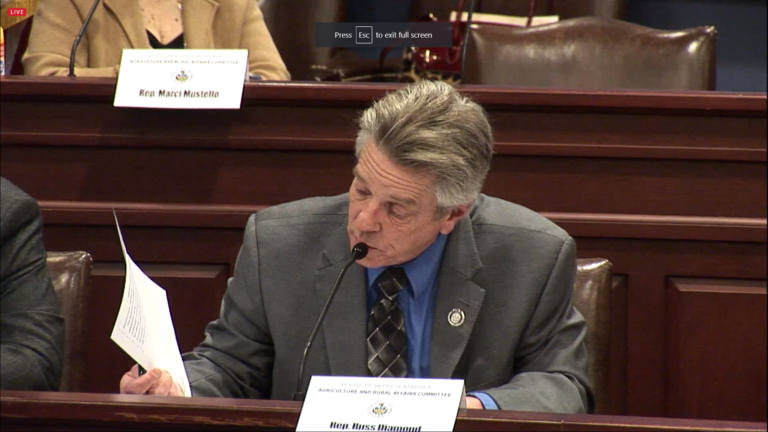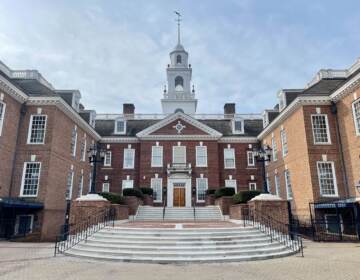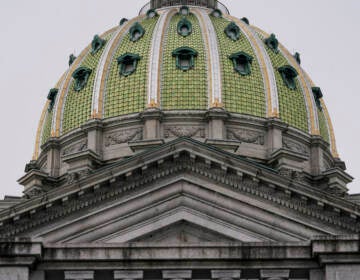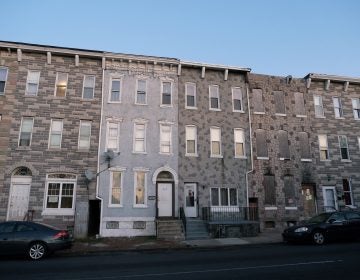Pa. coronavirus recovery: Gov. Wolf seeks censure against lawmaker for ‘misinformation’
“There are no words that adequately describe my disdain for the antics Rep. Diamond displayed in his latest missive,” said Governor Wolf.

State Rep. Russ Diamond (R-Lebanon) speaks during a House Agriculture & Rural Affairs Committee on April 27, 2020. (Ed Mahon/PA Post)
Updated at 4:35 p.m.
–
Are you on the front lines of the coronavirus? Help us report on the pandemic.
The Pennsylvania Department of Health on Thursday reported 860 additional cases of COVID-19, raising the state’s total to 111,078. There are currently 7,176 total deaths attributed to the virus, an increase of 14 new deaths.
Philadelphia health officials reported 136 additional coronavirus cases, raising the city’s total to 30,213. The city confirmed 11 new fatalities, bringing the total number of residents who have succumbed to the virus to 1,691.
Gov. Wolf seeks censure against lawmaker for “misinformation”
Pennsylvania’s governor wants state House GOP leaders to formally reprimand one of its rank-and-file members, both for urging constituents to go maskless if they prefer it, and for a press release he issued that was widely seen as disrespecting Health Secretary Rachel Levine.
Representative Russ Diamond (R-Lebanon) has long chafed at Governor Tom Wolf’s pandemic emergency order, and has flaunted his choice to not wear a face mask in public, despite rising COVID-19 rates.
This week, after Health Secretary Rachel Levine released a statement responding to recent, transphobic attacks on her, Diamond tweeted a press release of his own, clearly cribbing most of Levine’s words, mimicking the tone of her statement, and using it to denounce “hateful and intolerant comments directed towards the unmasked community.”
In response, Wolf jumped into the fray.
“Abhorrent, disrespectful, dangerous,” his office wrote Thursday. “There are no words that adequately describe my disdain for the antics Rep. Diamond displayed in his latest missive.”
The governor called Diamond’s actions a “thinly veiled attack on the LGBTQ community” and Levine, and a display of “ignorance” of clear, public health realities.
“To equate any disrespect for those not wearing masks to the decades of disrespect, threats and violence against our LGBTQ community goes far beyond the hallmarks of a decent society. For these actions to come from a legislator elected to fairly represent all his constituents is simply unforgivable,” Wolf said.
He called for House GOP leaders — Speaker Bryan Cutler (R-Lancaster) and Leader Kerry Benninghoff (R-Centre) — to immediately introduce a resolution to censure Diamond.
Censure involves a majority of lawmakers voting to condemn a certain action. It doesn’t necessarily carry any punishment beyond symbolic, public disapproval.
Diamond, in return, called for Levine’s dismissal and Wolf’s resignation.
House Republican leaders have not responded.
Feds waffle on eviction moratorium, but Pa. is safe for now
A federal CARES Act moratorium on renter evictions ended on July 25, and thus far, the U.S. House and Senate haven’t decided how — or if — to reinstate it.
Renters and homeowners in Pennsylvania, however, can be confident in the roof over their head until at least August 31, which is when a statewide moratorium on evictions and foreclosures is set to expire.
The state also has a $150 million rent assistance program, funded by CARES Act dollars, that is available to any Pennsylvanian who can prove they’ve either filed for unemployment or lost a minimum of 30% of their income, so long as that income is equal to or lower than their county’s median.
In Philadelphia, evictions are on hold slightly longer. Due to rising coronavirus cases in the city, landlord-tenant courts are slated to be closed through at least September 2.
Federal waffling means that right now, renters’ housing situations vary widely by state.
New Jersey lawmakers, for instance, are weighing a bill that would codify an emergency order that Gov. Phil Murphy filed in March, which banned evictions and foreclosures until 60 days after the public health emergency is declared over.
The measure would extend that period to 90 days post-emergency, plus let courts order lenders to retract negative credit reports related to nonpayment, stop courts from accepting nonpayment complaints, and bar landlords from imposing late fees.
Renters in New Jersey already have some protection thanks to Murphy’s existing emergency order, which is still in effect. Courts can still take nonpayment filings, but they’re barred from removing anyone from their home or apartment.
Evictions in Delaware are moving forward in the absence of a federal moratorium, but Gov. John Carney has ordered all of them to be stayed at least temporarily so the state can mediate where it deems necessary. Utilities and insurance companies are also ordered to offer payment plans to struggling renters and homeowners, and the state has a housing assistance pool largely funded through CARES Act dollars.
But state and city reprieves and assistance don’t entirely save renters and homeowners who are struggling due to coronavirus from their financial woes.
Back rent will still, eventually, come due, and analysts estimate that payments deferred through the CARES Act alone — not counting city and state deferments — now total an unprecedented $21.5 billion and could loom over renters for many years.
That impending debt is compounded by the fact that if Congress doesn’t extend it, the $600-per-month in extra unemployment benefits that the U.S.’s many out-of-work people have been relying on is set to expire at the end of July.
The CARES Act never covered every renter — just ones living in properties that had received federal-backed mortgage loans or other federal assistance. Of the country’s 43 million or so renters, about a third are estimated to be affected by the act.
People living in states and municipalities without their own eviction protections are now vulnerable to their landlords charging late fees and asking them to leave, though even the current CARES Act language stipulates that formal evictions can’t be filed until August 25.
It’s likely that protections will ultimately be extended anyway, even if Congress doesn’t act — as they are eventually expected to — before evictions can be filed.
President Donald Trump and Treasury Secretary Steven Mnuchin have recently said they’re aiming for a short-term extension of eviction protections and federal unemployment benefits — though it’s unclear if other Republicans will get on board.
Philadelphia officials urge caution
Coronavirus cases are rising in Philadelphia.
Health Secretary Thomas Farley said Thursday that the city has seen 136 new cases in the past day alone, for a total of 30,213 since the pandemic began. In the past week, he said the city has been averaging about 165 cases per day, up from 141 cases the week before and 111 the week before that.
Most of the cases have been among less vulnerable young people. But Farley noted, even though rates of hospital stays remain much lower than they were at at the peak of the pandemic, they’re ticking up.
Eleven people have died over the last 24 hours, for a total of 1,691.
Farley added that cases are, indeed, increasing across Pennsylvania as a whole — though there is at least one positive sign: case counts are starting to fall nationwide, particularly in states that were hotspots for case resurgences in the last month, like Texas and Arizona.
He said the city is still trying to expand testing sites, but that wait times for laboratory results are “unacceptably long” due to nationwide backlogs, and the health department is looking into processing more tests locally.
Farley reaffirmed the city’s previous order for indoor dining to be prohibited through at least Sept. 1, but apologized for giving restaurant owners and managers “not enough time” to plan for the new rule.
He said the Sept. 1 reopening is not definite, but that the city will give restaurants at least ten days of notice before extending the closure even further.
The secretary also warned Philadelphians — especially those who are elderly or have health issues — not to grow complacent as pandemic restrictions drag on.
“There is clearly more virus circulating in Philadelphia right now than is safe,” he said.
He urged everyone, regardless of risk level, to wear a mask whenever they’re out in the city.

Get daily updates from WHYY News!
Kenney blames trash problem on weather, pandemic-induced behavior changes
Mayor Jim Kenney is trying to assuage Philadelphians’ frustrations about widespread garbage collection delays, which have left garbage rotting on sidewalks and in alleys citywide, and led to rubbish and recycling complaints to the city’s 311 line increasing to 10 times their normal level.
He blamed the lack of trash pickup on several factors.
“We’ve had a high number of employees who have come down with the virus, we’ve had extremely hot weather — we haven’t had a day under 70 since July 7, mostly in the 80s and 90s — we had two major storms that slowed up our progress, and people have been home … and generating a lot more trash than they normally would,” he said.
“Our guys got bogged down,” he concluded.
Others, like local union leaders, have blamed the delays on poor management, not weather or pandemic-related trash increases. And sanitation workers have said the personal protective gear they’re being given doesn’t allow them to do their grueling jobs safely during a pandemic.
Kenney said the city is adding 120 new laborers who were already on city waiting lists for jobs. Those workers are being onboarded now, and will be added to complement the regular trash collectors on a temporary basis.
Asked when trash collection will be fully caught up, Kenney said the timeline would depend on a “cumbersome HR process.”
He said about a week ago, he was told the department would take two to three weeks to be caught up. His optimistic prediction, he said, is “soon.”
WHYY is your source for fact-based, in-depth journalism and information. As a nonprofit organization, we rely on financial support from readers like you. Please give today.




![CoronavirusPandemic_1024x512[1]](https://whyy.org/wp-content/uploads/2020/03/CoronavirusPandemic_1024x5121-300x150.jpg)


